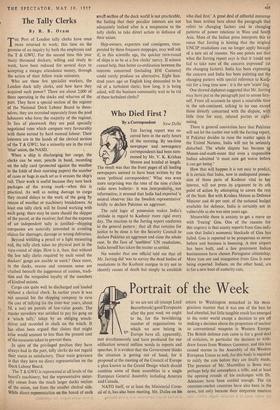The Tally Clerks
By R. B. Oram THE Port of London tally clerks have once more returned to work; this time on the promise of an inquiry by both the employers and the T & GWU. For the second time this year many thousand dockers, willing and ready to work, have been reduced for several days to accepting a meagre attendance money, through the action of their fellow trade unionists.
Who are these few specialist workers, the London dock tally clerks, and how have they acquired such power? There are about 2,000 of them operating in the docks and wharves of the port. They have a special section of the register of the National Dock Labour Board to them- selves; they are recruited separately from the pool labourers who form the majority of the register. In lieu of piecework they are paid specially negotiated rates which compare very favourably with those earned by hard manual labour. Their interests are in the hands of the clerical section of the T & GWU, but a minority are in the rival 'blue' union, the NASD.
When a ship is discharging her cargo, the clerks can be seen, pencils in hand, recording on the tally card (protected against the weather in the folds of their morning papers) the number of cases or bags in each set as it crosses the ship's rail. Their work is useful because they turn back packages of the wrong mark—when this is practical. As well as noting damage to cargo they record delays to the work of the gang by reason of weather or machinery breakdowns. At least one tally clerk will be found working with each gang; there may be more should the shipper of the parcel, or the receiver, feel that the expense of an independent tally is justified—shipping companies are naturally interested in avoiding claims for shortages, damage or wrong deliveries.
Beyond wielding a pencil or a light measuring rod, the tally clerk takes no physical part in the turn-round of ships. How is it, then, that without the few tally clerks required by each vessel the dockers' gangs are unable to work? Once more, in the docks, reason and common sense are crushed beneath the juggernaut of custom, tradi- tion and the misguided loyalty of the members of kindred unions.
Cargo can quite well be discharged and loaded Without a clerical check. In earlier years it was not unusual for the shipping company to save the cost of tallying (in the inter-war years, about 5d. a ton) on parcels of low-value goods. The master stevedore was satisfied to pay his gang on a 'winch tally,' taken by an obliging winch- driver and recorded in chalk on the winch. It has often been argued that claims that might arise would amount to Iess than the present cost of the measures taken to prevent them.
In spite of the privileged position they have always had in the port, tally clerks do not regard their status as satisfactory. Their main grievance is that they have no direct representation on the Dock Labour Board.
The T & GWU is represented at all levels of the board's machinery, but the representative natur- ally comes from the much larger docks section of the union, not from the smaller clerical side. While direct representation on, the board of each small section of the dock world is not practicable, the feeling that their peculiar interests are not adequately looked after is a temptation to the tally clerks to take direct action in defiance of their union.
Ship-owners, exporters and consignees, exas- perated by these frequent stoppages, may well ask if, in this scientific age, the quicker turn-round of ships is to be at a few clerks' mercy. If science cannot help, then better co-ordination between the interests concerned (including HM Customs) could surely produce an alternative. Eight hun- dred years ago an English king demanded to be rid of a turbulent cleric; how long, it is being asked, will the business community wait to be rid of these turbulent clerks?


































 Previous page
Previous page